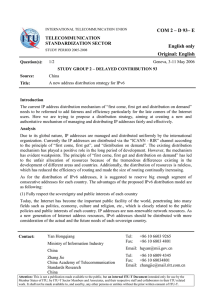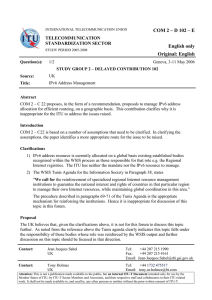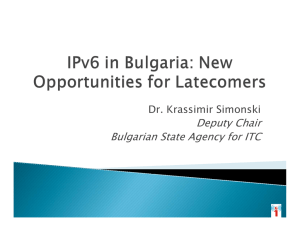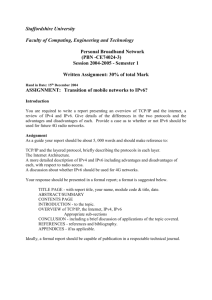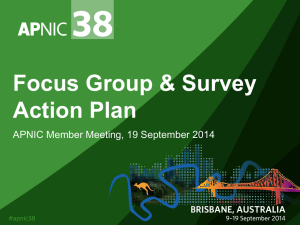Daily wrap-up ITU Workshop on IPv6 Detlef Eckert Advisor, European Commission (EC)
advertisement
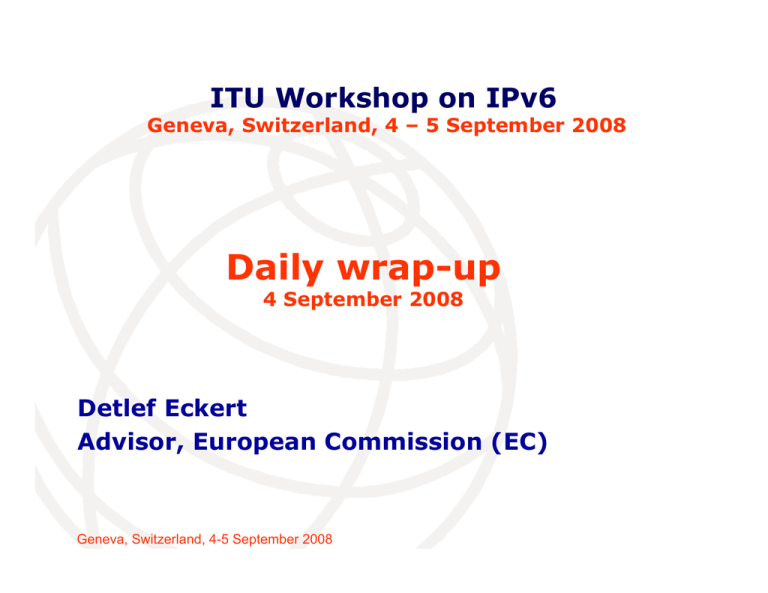
ITU Workshop on IPv6 Geneva, Switzerland, 4 – 5 September 2008 Daily wrap-up 4 September 2008 Detlef Eckert Advisor, European Commission (EC) Geneva, Switzerland, 4-5 September 2008 International Telecommunication Union Highlights from Session 1: “Factual introduction: Current situation” Remind ourselves IPv6 is a problem because of the success of the Internet IPv6 does not change much technically – which is an advantage and disadvantage NGN – IP layer is getting stretched Get ready needs about 3 years, therefore need to start now Chance in countries with less legacy infrastructure Problem is not in the core network, but in the periphery, support for smaller ISPs ITU Workshop on IPv6: Geneva, 4-5 September 2008 International Telecommunication Union Highlights from Session 1: “Factual introduction: Current situation” China Next Generation Internet IPv6: On the way to commercialisation Olympics experience Today, major challenges remain and are reported (for instance cost efficient IPv6 capable modems) Where does the demand come from? Research network leading, but corporate customers hesitating, consumers ignorant ITU Workshop on IPv6: Geneva, 4-5 September 2008 International Telecommunication Union Highlights from Session 1: “Factual introduction: Current situation” Countries on different paths “needs active involvement of governments” Training is an important issue, including practical experience and testbeds Information about EU projects: http://ec.europa.eu/information_society/p olicy/ipv6/index_en.htm http://ec.europa.eu/information_society/policy /ipv6/fap_rd/index_en.htm ITU Workshop on IPv6: Geneva, 4-5 September 2008 International Telecommunication Union Highlights from Session 2: “Technical issues of IPv6 migration” Only few AS’s offer IPv6 Most of IPv6 networks are not production networks DNS getting IPv6 ready Measurement of queries possible Standardisation needed to adapt IPv6 to NGN Migration strategy: from government to market ITU Workshop on IPv6: Geneva, 4-5 September 2008 International Telecommunication Union Highlights from Session 2: “Technical issues of IPv6 migration” IPv6 protocols mature and ready products proliferate, but transition mechanism still need research There is no major business driver However ISPs are aiming for business continuity Application driven views show IPv6 advantages ITU Workshop on IPv6: Geneva, 4-5 September 2008 International Telecommunication Union Highlights from Session 3 “Economic dimension of IPv6 adoption. What is at stake?” Migration to IPv6 is uncertain, as regards when and if. Allocation model today is on (technical) need; problem of early address allocation; mechanics/economics of re-allocation (reclaim, transfer, … ) Avoiding routing problems Different models proposed Quality and Integrity of address allocation ITU Workshop on IPv6: Geneva, 4-5 September 2008 International Telecommunication Union Highlights from Session 3 “Economic dimension of IPv6 adoption. What is at stake?” Involvement of all actors IPv6 address allocation does not seem to create any problems Historical imbalance of IPv4 address allocation, hence smooth IPv6 transition needed What costs issues are implied? Specific issues of developing countries? ITU Workshop on IPv6: Geneva, 4-5 September 2008 International Telecommunication Union The “biased” conclusions of the Chair Wait for IPv4 pain to grow sufficiently or do something particular? Governments have a role to play However, they should seriously start to use IPv6 Presumably, IPv6 will be driven by ISPs keen to ensure business continuity or/and by edge networks (multi-play applications, sensor networks, …) In case IPv6 takes off, I would not be surprised to see a faster migration (i.e. no dual stack) than commonly expected today ITU Workshop on IPv6: Geneva, 4-5 September 2008 International Telecommunication Union The “biased” conclusions of the Chair Architecture comparisons of IPv4 to IPv6 could be helpful, to demonstrate the value of a more agile network to decision makers Uncertainty about IPv6 migration; what happens if IPv6 does not get deployed? Transfer markets Role of RIRs Policy framework Routing table issues DNS seems to be managed without major issues, however responding issue, DNSSec and NAT-PT ITU Workshop on IPv6: Geneva, 4-5 September 2008 International Telecommunication Union
